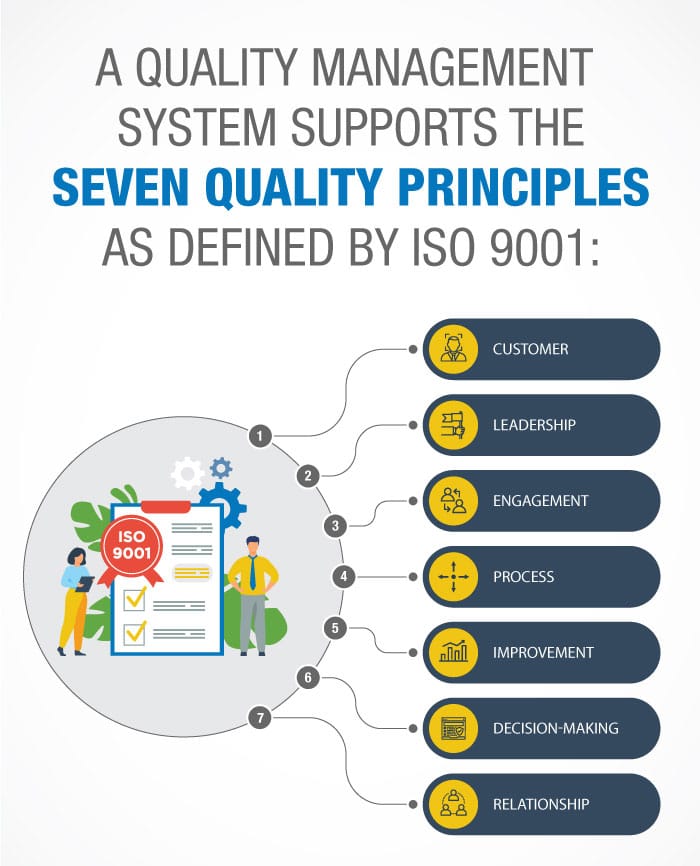Quality Management System (QMS)
Quality management systems create happy customers while improving
business operations, employee engagement and overall profitability.
What is a Quality Management System?
A Quality Management System (QMS) is not a software or technology solution. Instead, it is the collection of business processes,
policies and procedures intended to continuously improve the quality of products or services and to ensure that customer
expectations are met or exceeded. The benefits of a QMS include:

Reduce Cost
Reducing waste while preventing costly nonconformances and errors.

Improve Efficiency
More consistent processes, reduced downtime and better risk management.

Foster Quality Culture
Establish and share corporate goals, improve employee engagement and stakeholder communications.

Increase Customer Satisfaction
Better understanding of customer needs and timelier response to customer feedback.
What quality standards exist globally?
Quality management is an important company initiative around the world. Every business wants to improve customer satisfaction and their bottom line. There are many different quality standards: national, international, generic and industry specific.
Most quality standards are optional, but they are so effective that business forces inside a company’s supply chain make them mandatory. Examples of global quality standards include:
- AS9100 - Aerospace industry
- IATF 16949 - Automotive Industry
- ISO 13485 - Medical device industry
- ISO/IEC 17025 – Testing and calibration laboratories
- TL 9000 – Telecommunications industry
- ISO 22000 - Food Safety Management
- CFR Title 21 Part 820 - Food & Drug Administration Quality System Regulation
What is the ISO 9001 quality management system standard?
ISO 9001 is an international standard for creating and maintaining a Quality Management System. It can be used by any company of any size operating in any industry or location. The standard is an established set of requirements and recommendations for creating business processes, policies and procedures that ensure customer expectations are met or exceeded. Although it is an optional, self-directed standard, many companies insist on ISO 9001 certification for their supply chain partners.
What are the 7 quality management principles?
The ISO 9001 standard for quality management identifies seven key principles:
- Customer: To meet and exceed customer expectations.
- Leadership: Create the quality goals and build the processes and consensus that will achieve them.
- Engagement: All workers at all levels need to buy-in to the company’s quality goals for any chance of success.
- Process: Define standard and measurable processes that support leadership vision and corporate quality goals.
- Improvement: Quality improvement drives innovation and responsiveness, which are key components of a QMS.
- Decision-making: Measurement and evaluation are necessary for quality improvement and the Plan-Do-Check-Act cycle.
- Relationships: Successful companies need to manage their relationships with suppliers and other stakeholders as much as their customers.

What is Quality Management System Software?
Quality management system software is a centralized SaaS solution that automates many parts of your QMS. What is important depends on a company’s location and industry, but some of the most essential components include:
- Employee Training: Optimize Quality training across your organization, helping you to improve performance, reduce risk and increase engagement.
- Corrective and Preventative Action (CAPA): Identifies, anticipates and correct defects and nonconformances that prevent your products or services from meeting customer requirements.
- Root Cause Analysis (RCA): Use proven methods (Pareto, 5-Why, Fishbone and more) to perform root cause analysis and better understand the causes of nonconformances, plan corrective actions and reduce the risk of reoccurrence.
- Audits & Inspections: Schedule, track and create reports for internal or external audits and inspections. View and access details including type, scope, objective, results and any required follow-up actions.
- Action Plans: Develop, review, and communicate plans and processes for the resolution of nonconformances or any operational issue that needs to be resolved.
- Nonconformance Reporting: Holistic management of nonconformances including gathering data and information, analyzing root cause and assigning corrective and preventative actions.
What are the benefits of using Quality Management System Software?
Quality Management System (QMS) software streamlines and automates your organization's quality program. It centralizes the collection, analysis and reporting of quality data and makes it easy to create new processes, evaluate their effectiveness and improve them as required. QMS software simplifies employee training and communications to build a strong quality culture and ensure that all stakeholders are informed about program success and failures.
Learn how Intelex Quality Management Software simplifies your QMS to save you time and money.
Expand your QMS knowledge
with these featured resources
insight report
Learn how a Quality Management System (QMS) helps you deal with the increasing scope and complexity of global quality standards.
product demo
See the usability and breadth of features of Intelex's Quality Management software and how it streamlines your QMS.
on-demand webinar
Join industry expert Dr. Gregory Watson—Chairman of Business Excellence Solutions, and learn how to future-proof your quality management system.




